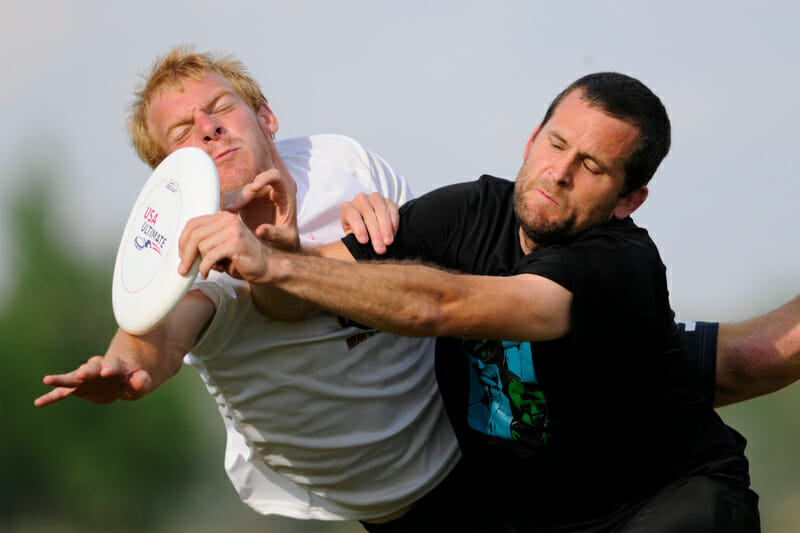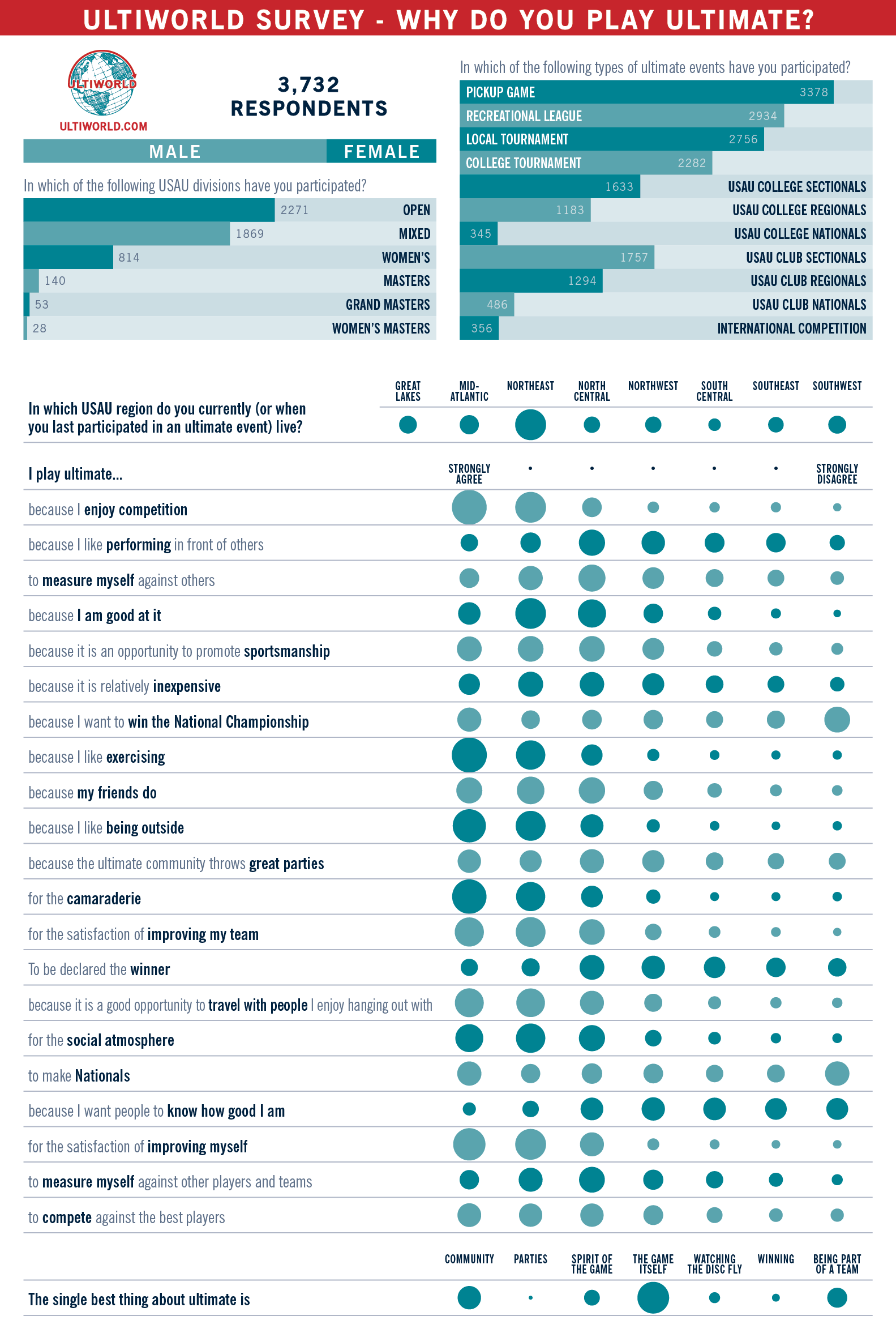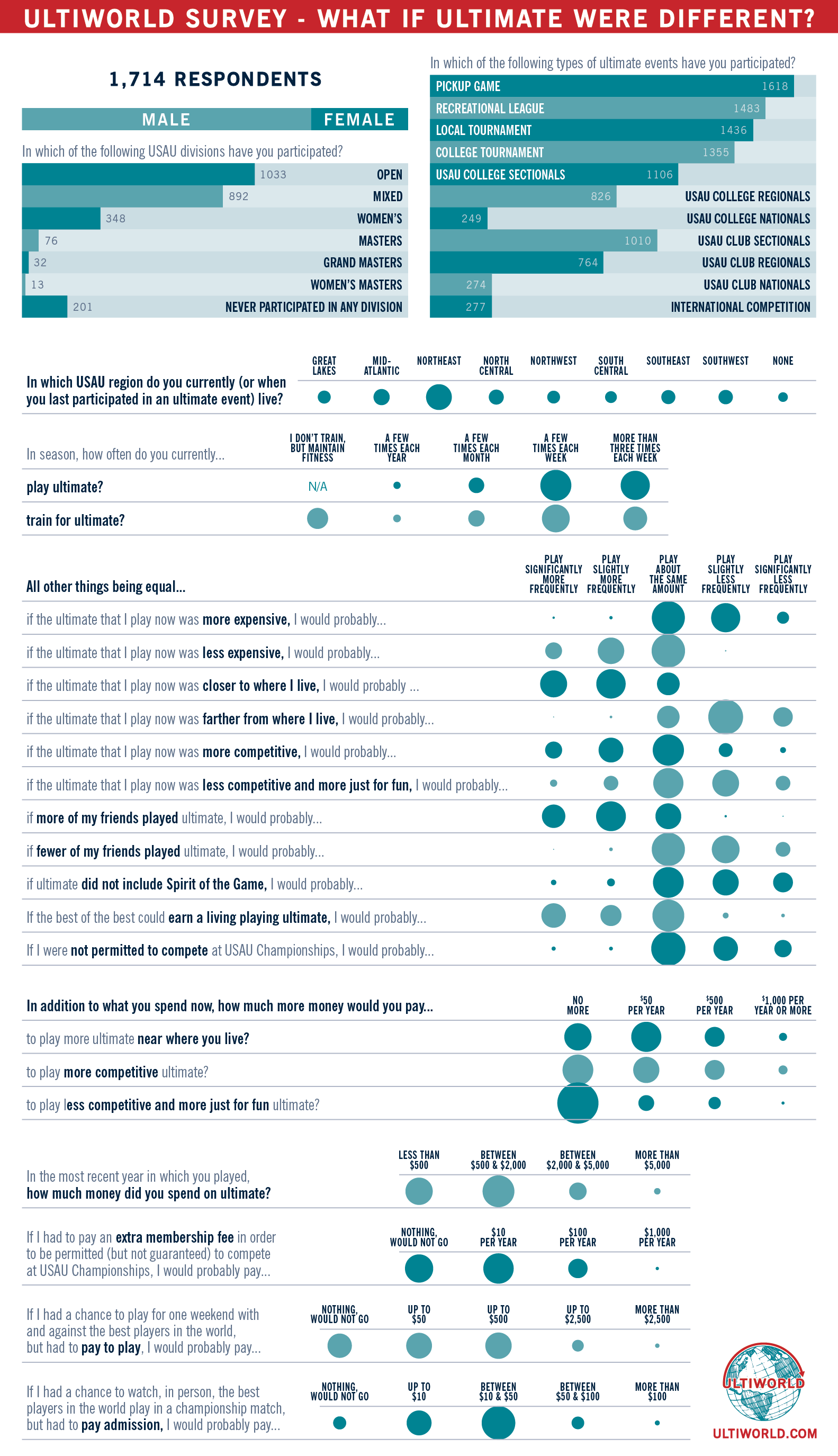March 6, 2013 by John Korber in Analysis with 4 comments

If you are reading this, you probably already know about many of the exciting things that have happened in and around ultimate over the past several years. As a community, we have seen unprecedented increases in the commercialization of ultimate.
While early commercial ventures focused on apparel, more recent ventures have included statistical tracking software, video production companies, and even professional leagues. The creation of these “add-ons” to the core existence of ultimate as a pastime have introduced a wide range of motives for people to get involved with the sport.
Simply put, people are not just coming to ultimate because of the personal enjoyment that playing provides anymore. Financial, social, ethical, and other complex motives are driving the evolution of our sport, and their coexistence muddies what used to be relatively clear water on the question of why we choose to play. Although the question of why is often obvious when discussing organizations throughout the sport, why players choose to play is a much more complex and personal issue.
Over the past year, I have witnessed countless discussions, across multiple forums, in which people have casually stated things like “the players want this…” or “people don’t care about that…” Players have been compared to players in other sports, at a variety of levels, and inferences have been made about the values and opinions of the playing masses. Such statements are, typically, hugely unsupported and, at best, overgeneralized. The uncertainty as to the motives and values that drive player involvement in ultimate has created well documented complications for the USA Ultimate, as it attacks a daunting task of serving a large population of players with a wide array of preferences about how they like their ultimate served.
Back in November, both for myself and for the community at large, I created and distributed a pair of surveys to help clarify this issue. The surveys asked a series of questions about why players choose to play, and how their decisions to play might change if ultimate was different. Over a two week span, more than five thousand people responded to the surveys. If all you really want to see is the results, scroll down to see the infographics. The data from the two surveys are available for download here (Why Do You Play?, What if Ultimate Was Different?) and I hope others will do their own analysis and share them with the community.
Click to expand:
The following paragraphs summarize my conclusions from the the data and my experiences in ultimate, highlighting key sets of responses and data. The analysis is not ideally scientific, but was never intended to be. Instead, my hope is that the data will provide a broad level of exposure to the trends in thought among players in our community, while fueling thoughtful conversation and inspiring action to better serve the ever changing group of people who call themselves ultimate players.
***
The breadth of people who play ultimate in some form is clearly wide. There are players who only play in pick-up games, no more than a few times a year….and there are players who train every day, logging thousands of hours each year, with hopes of maximizing their individual and team performance to someday be the best in the world. And then there is everyone in between. To summarize and generalize the values of such a range of people is in some ways impossible. But despite the significant differences between how, where and to what end these players choose to play, they probably do share some common values.
The first survey, “Why Do You Play Ultimate?” attempted to capture these commonalities. As one might expect, the responses support the theory that in general, there are values which are shared among large segments of the playing community. Specifically, I believe those values are, in no particular order: being part of a team, competition, personal satisfaction, physical fitness, and social connection. The values are clearly interconnected, and people with this value set have found many different activities which can serve them. Ultimate is an example of such an activity. I suspect that anyone who enjoys playing ultimate would describe some combination of these values as the primary reason for playing.
Note that these values are each generally internally focused, and are not directly connected to fortune, fame, or other external factors. It is my experience that this focus, on internally satisfying activities, is also a primary characteristic of mainstream professional athletes. Generally speaking, the world’s best athletes, although often paid handsomely and lauded as public role models, play their sports for the competition and satisfaction that it brings them and not for the fringe benefits that their positions can bring.
Ultimate players tend to place different levels of emphasis on the individual values, and these differences, as well as other life factors (athletic ability, geographic location, socioeconomic conditions, personal and professional obligations), inform the way that a given player chooses to play. This reality, often referred to as “fit” in customer analysis discussions, ultimately drive the decisions that players make about their ultimate career. When the combination of these factors in a player’s life aligns well with the costs and benefits of ultimate, the player chooses to play. When the two fall out of alignment, the player chooses not to play.
I have seen ultimate fans complain about the sudden disappearance of a marquee player from the ultimate spotlight. These fans, often younger players with plenty of time and energy to dedicate to the sport, wish that the game’s best would stick around. They say, “Players like Peyton Manning, Derek Jeter and Tim Duncan never simply walk away, or take a year off. Why do ultimate players do it?” Names like Mike Grant, Fortunat Mueller, Alex Nord and Josh Ziperstein come to mind…and the answer is simple. The fit changes.
Personal lives, school situations, career changes and myriad other factors impact our lives, and when the fit changes, players choose to serve their values somewhere where the fit is better. Ultimate shouldn’t be offended, this is simply the reality of how consumers make decisions. In this case, players are the consumers. Manning, Jeter and Duncan manage the fit in their lives as well…but $25 million can buy a lot of fit. So can an unrelenting desire, above everything else in one’s life, to be the best in the world at your trade. And while there are clearly ultimate players who take their careers very seriously, there are only a handful who have literally put the rest of their lives on hold to pursue being the absolute best ultimate player they can be. This is simply a reality of the values of the individual and the choices those values inform.
The second survey, “What if Ultimate was Different?”, asked players to indicated how their participation in ultimate might change if some of the characteristics of the ultimate in their lives changed. Because fit is about the mating of the characteristics of the product with the needs of the consumer, changes to ultimate can affect fit just as easily as changes in a player’s life. Changes to the rules, locations, time, format, cost or other parts of the entirety of the ultimate experience will continue to impact who chooses to play. As evidenced by the roller coaster that has been the Triple Crown Tour, managing these changes, currently an undertaking of the USAU, comes with difficult decisions and consequences. It is an unenviable position that will continue to be challenged by free-market forces seeking to serve a complex group of consumers.
Outsiders, of all sports, can easily become misguided as to the real factors that inform why players play. Phrases like “the glory” and “for the good of the game” and “to be famous” get thrown around freely. Occasionally the outspoken player criticizes the media for creating hype and focus around the wrong things. The players play because they want to and because they can. In ultimate’s case, they want to because the game provides them with personal growth, satisfaction and enjoyment, a sense of community and camaraderie among teammates and opponents alike, and competition. They can because the game provides these things at a cost, financially, professionally, and personally, which is amenable to them. Together, this combination creates a good fit.
Below are some selected quotes from “Why Do You Play Ultimate?”. They do not particularly represent my opinions, but stood out as interesting examples of the breadth of opinions submitted:
“A reason why I’ve come to love ultimate is how it brings people together and allows us to meet people with great skills and personality. I do not just mean in the US but throughout the world. I studied abroad in New Zealand my junior year of college and albeit the pick-up that existed in my town was made up of 90% exchange students/Americans, I also go to meet people of New Zealand origin who played the sport. Also, the Americans I played with came from all over the US and I see them at all kinds of ultimate situations whether it be at a tournament, a tournament party or the city of where a tournament is at. I think it’s really cool that no matter where you are in the US or abroad, you can find ultimate.”
“I am responding as a retired 52 year old with a passion for the sport, but age, basketball, work and family have pulled me away from the day-to-day fun I had in college and clubs in the 80s and CUC Summer League in the 90s. Hence, some of my answers are ‘projected’ based on my earlier experiences and feelings about the game.”
“I love competition any way I can get it, but I don’t need ultimate for that. I can find that pretty much anywhere. The reason I play is for the people and the atmosphere, on and off the field. I love the sense of community within the sport. I think the best part of the game, by far, is the emphasis on spirit of the game and self-officiating. To play this sport well, you have to not only be a talented player, but also a genuinely good person, and there is no other sport or activity I have encountered that can boast the same standards.”
“I love playing the game. And even though I go to BYU and only play on saturdays I love the competition that every school brings. Just wish we could go to nationals one day :\”
“I play because I like working together with other talented, passionate individuals to achieve a common goal. My most enjoyable experiences playing are when I can trust everyone I am playing with, and they all trust me. It’s the fact that we are all talented, we all love the game, we are all passionate about the sport, we are all competitive, and we all share a mindset of giving every point everything we’ve got every time we step on the field. When you have a group of guys with every single one of their minds trained on being a dominant player, using their skills and talent to the fullest, and all wanting to push themselves to the limits to be competitive and win…. there is nothing better. It’s so exhilarating and it makes you want it that much more, because you know everyone around you wants it, bad. That’s why I play – for moments where my team and I are a machine set to give our all 100% of the time, win or lose.”
“I play because the exercise, the outdoors, and the community make me feel free. It gives me sense of self and I am very at home on the field.”
“I stopped playing because got bored with it and too much time commitment on high-level competitive teams, yet low-level non competitive is not as fun.”
Below are some selected quotes from “What if Ultimate was Different?”. They do not particularly represent my opinions, but stood out as interesting examples of the breadth of opinions submitted.
“Creating healthier childhoods in both physical and mental aspects by creating a low barrier-to-entry sport with uncompromised, but clear philosophies. The sport can be a shining example of how competing should be bringing people together, even at the professional level, for both athletes and fans.”
“Don’t buy into the hype of ‘refs make the game watchable’. Ref’s can make bad calls just like players. Instead, encourage and educate players to make their calls clear and then resolved quickly.”
“I think ultimate is primarily a sport for those who play it. I think it’s a shame to see major changes to the structure of ultimate that focus on its exposure to non-players. Decisions should be made solely based on providing the best experience for ultimate players.”
“More high level spectator availability! More Pro ultimate! More instant replays and better commentators! I’m already a mediocre athlete and will soon be old and broken, but I’ll always want to watch.”
“I would like to see event quality and safety improve at all levels. I would like to see more communities grow and develop in a well-integrated, such that a larger community exists, including players and organizers at all levels. Charlotte, NC is a good example.”
“I would love if it were cheaper. I pretty much live on a few hundred dollars a semester and have to forgo certain things in order to have the money to pay for even my USAU membership.”
“I would not like to see ultimate change much. If professional ultimate takes hold, I would hope that elite/top level players continue to interact and play with lower level players.”
“No refs, more high-profile games I can attend in my area, more of a spectator culture, but always has its roots in players.”
“Regional Pro Leagues to build fan bases. Then promotion to ever more super-regional and national (and International) Pro leagues. See UEFA Pro Club Promotion/Relegation (Champions League) model.”
“I’d like to see polls with less loaded agenda-driven questions.“

